Sweden in the Eurovision Song Contest
| Sweden | |
|---|---|
| Member station |
Sveriges Television (SVT) Former members
|
| National selection events |
Internal selection
|
| Appearances | |
| Appearances | 56 (55 finals) |
| First appearance | 1958 |
| Best result | 1st: 1974, 1984, 1991, 1999, 2012, 2015 |
| Worst result |
Last: 1963, 1977 Nul points: 1963 |
| External links | |
| SVT Official Homepage | |
| Sweden's page at Eurovision.tv | |
|
Sweden in the Eurovision Song Contest 2016 | |
Sweden has participated in the Eurovision Song Contest 56 times since making its debut in 1958, missing only three contests since then (1964, 1970 and 1976). Sweden is one of the most successful competing nations at the Eurovision, with a total of six victories in the contest, only behind Ireland who have seven wins. Sweden is also the contest's most successful country of the 21st century, with two wins from nine top five results. In total, Sweden has achieved 23 top five results in the contest. Since 1959, the Swedish entry has been chosen through an annual televised competition, known since 1967 as Melodifestivalen.
Sweden's first entrant in the contest was Alice Babs in 1958, who was placed fourth. This remained the country's best result until 1966, when Lill Lindfors and Svante Thuresson were second. Sweden's first Eurovision victory was in 1974 with the song "Waterloo", performed by ABBA. Thanks to their victory in Brighton, ABBA went on to gain worldwide success and become one of the best-selling pop groups of all time. In the 1980s, Sweden achieved three successive top three results. After Carola finished third in 1983, the Herreys gave Sweden its second victory in 1984 with "Diggi-Loo Diggi-Ley". Kikki Danielsson then finished third in 1985. Carola returned to the contest in 1991, to give the Swedes their third win with "Fångad av en stormvind", defeating France in a tie-break. Charlotte Nilsson gave the country a second win of the decade in 1999, with "Take Me to Your Heaven". The 1990s also saw two third-place results, for Jan Johansen in 1995 and One More Time in 1996. In the 2000s, the best Swedish result was fifth place, which they achieved four times, with Friends in 2001, Fame in 2003, Lena Philipsson in 2004 and Carola, who in 2006, became the only Swedish performer to achieve three top five results.
In 2010, Anna Bergendahl became the first Swedish entrant to fail to make it to the final, finishing 11th in the semifinal, only five points from qualifying ahead of the Cypriot entry (in 2008, Charlotte Perrelli finished 12th in the semifinal but qualified through the back-up jury selection). Since then, the country has been very successful, finishing in the top five in five of the last six contests, including victories for Loreen, who gave Sweden its fifth victory in 2012 with the song "Euphoria", making Sweden one of only two countries (along with the United Kingdom) to have Eurovision victories in four different decades, and winning for the sixth time with Måns Zelmerlöw's "Heroes" in 2015. Sweden is one of only two countries - along with Ukraine in 2004 and 2016 with Ruslana and Jamala respectively - to win twice since the introduction of the semi-finals in 2004, performing the feat in both 2012 and 2016 with 372 and 365 points respectively, making Sweden additionally the only country to have scored 300 points or more twice. They also finished third in 2011 with Eric Saade and "Popular", third in 2014 with Sanna Nielsen and "Undo", and fifth with Frans and the song "If I Were Sorry" in 2016.
Sweden has hosted the Eurovision Song Contest six times and is the only country to have hosted the event in five different decades, three times in Stockholm (1975, 2000, and 2016), twice in Malmö (1992 and 2013) and once in Gothenburg (1985). Together with Croatia and Malta it was the only country to never be relegated, under the previous rules of the contest, that wasn't a part of the Big Four.
Sweden was one of the first five countries to adopt televoting in the 1997 contest.
Melodifestivalen
Melodifestivalen is an annual music competition organised by Swedish public broadcasters Sveriges Television (SVT) and Sveriges Radio (SR). It has chosen the country's representative for the Eurovision Song Contest since 1959. It is Sweden's most popular television shows, and it has been estimated that more than 4 million Swedes watch the show annually.
Almost every Swedish entry for Eurovision has been selected through Melodifestivalen. Only Sweden's first entry in 1958, was not selected through Melodifestivalen, having been selected internally by the Swedish broadcaster at the time, Swedish Radio Service.
Contestants
- Table key
- NOTES:
- a. ^ In 2008, Sweden qualified through the back-up jury selection.
- b. If a country had won the previous year, they did not have to compete in the semi-finals the following year. In addition from 2004-2007, the top ten countries who were not members of the big four did not have to compete in the semi-finals the following year. If, for example, Germany and France placed inside the top ten, the countries who placed 11th and 12th were advanced to the following year's grand final along with the rest of the top ten countries.
Congratulations: 50 Years of the Eurovision Song Contest
In 2005 to celebrate 50 years of the Eurovision Song Contest, Denmark hosted a special one-off contest on behalf of the EBU to find Europe's favourite Eurovision song of the first 50 years. Tipped as the favourite from the start, ABBA won the contest by a landslide with "Waterloo" coming first in the semi-final with a record 331 points and then going on to win the contest with 329 points in the final. Alongside other Eurovision stars, Carola Häggkvist and Elisabeth Andreassen helped introduce and present small parts of the show.
- Table key
| Year | Artist | Language | Title | Final | Points | Semi | Points | Final (1974) | Points (1974) |
|---|---|---|---|---|---|---|---|---|---|
| 1974 | ABBA | English | "Waterloo" | 1 | 329 | 1 | 331 | 1 | 24 |
Voting history
As of 2016, Sweden's voting history is as follows:
|
| ||||||||||||||||||||||||||||||||||||||||||||||||||||||||||||||||||||||||||||||||||||
Hostings
| Year | Location | Venue | Presenters |
|---|---|---|---|
| 1975 | Stockholm | Stockholm International Fairs | Karin Falck |
| 1985 | Gothenburg | Scandinavium | Lill Lindfors |
| 1992 | Malmö | Malmö Isstadion | Lydia Cappolicchio and Harald Treutiger |
| 2000 | Stockholm | Ericsson Globe | Kattis Ahlström and Anders Lundin |
| 2013 | Malmö | Malmö Arena | Petra Mede |
| 2016 | Stockholm | Ericsson Globe | Petra Mede and Måns Zelmerlöw |
Marcel Bezençon Awards
Artistic Award
Voted by previous winners
| Year | Performer | Song | Final Result | Points | Host city |
|---|---|---|---|---|---|
| 2002 | Afro-dite | "Never Let It Go" | 8th | 72 | Tallinn |
| 2006 | Carola | "Invincible" | 5th | 170 | Athens |
Voted by commentators
| Year | Performer | Song | Final Result | Points | Host city |
|---|---|---|---|---|---|
| 2012 | Loreen | "Euphoria" | 1st | 372 | Baku |
| 2015 | Måns Zelmerlöw | "Heroes" | 1st | 365 | Vienna |
Composer Award
| Year | Song | Composer(s) Lyrics (l) / Music (m) |
Performer | Final Result |
Points | Host city |
|---|---|---|---|---|---|---|
| 2012 | "Euphoria" | Thomas G:son (m & l) and Peter Boström (m & l) | Loreen | 1st | 372 | Baku |
| 2013 | "You" | Robin Stjernberg, Linnea Deb, Joy Deb and Joakim Harestad Haukaas |
Robin Stjernberg | 14th | 62 | Malmö |
Winners by OGAE members
| Year | Song | Performer | Final Result | Points | Host city |
|---|---|---|---|---|---|
| 2008 | "Hero" | Charlotte Perrelli | 18th | 47 | Belgrade |
| 2012 | "Euphoria" | Loreen | 1st | 372 | Baku |
| 2014 | "Undo" | Sanna Nielsen | 3rd | 218 | Copenhagen |
Commentators and spokespersons
Over the years SVT commentary has been provided by several experienced radio and television presenters, including Jacob Dahlin, Ulf Elfving, Harald Treutiger, Pekka Heino, Kristian Luuk and Fredrik Belfrage. However, since the 2009 Contest, Edward af Sillén has provided the SVT commentary alongside Shirley Clamp, Christine Meltzer Lind, Hélène Benno and Gina Dirawi.
| Year(s) | Television commentator | Dual television commentator | Radio commentator | Spokesperson |
|---|---|---|---|---|
| 1957 | Nils Linnman | No dual commentator | No radio broadcast | Sweden did not participate |
| 1958 | Jan Gabrielsson | Same as television broadcast | Tage Danielsson | |
| 1959 | Roland Eiworth | |||
| 1960 | Tage Danielsson | |||
| 1961 | Roland Eiworth | |||
| 1962 | Tage Danielsson | |||
| 1963 | Jörgen Cederberg | Edvard Matz | ||
| 1964 | Sven Lindahl | Sweden did not participate | ||
| 1965 | Berndt Friberg | Edvard Matz | ||
| 1966 | Sven Lindahl | |||
| 1967 | Christina Hansegård | |||
| 1968 | ||||
| 1969 | ||||
| 1970 | No television broadcast | Sweden did not participate | ||
| 1971 | Åke Strömmer | Ursula Richter | No spokesperson | |
| 1972 | Bo Billtén | Björn Bjelfvenstam | ||
| 1973 | Alicia Lundberg | Ursula Richter | ||
| 1974 | Johan Sandström | Sven Lindahl | ||
| 1975 | Åke Strömmer | |||
| 1976 | No television broadcast | Sweden did not participate | ||
| 1977 | Ulf Elfving | Åke Strömmer & Ursula Richter | Sven Lindahl | |
| 1978 | Kent Finell | |||
| 1979 | ||||
| 1980 | Arne Weise | |||
| 1981 | No radio broadcast | Bengteric Nordell | ||
| 1982 | Kent Finell | Arne Weise | ||
| 1983 | Agneta Bolme-Börjefors | |||
| 1984 | Fredrik Belfrage | No radio broadcast | ||
| 1985 | Jan Ellerås & Rune Hallberg | |||
| 1986 | Ulf Elfving | Jacob Dahlin | ||
| 1987 | Fredrik Belfrage | Jan Ellerås | ||
| 1988 | Bengt Grafström | Kalle Oldby | Maud Uppling | |
| 1989 | Jacob Dahlin | Kent Finell & Janeric Sundquist | Agneta Bolme-Börjefors | |
| 1990 | Jan Jingryd | Kersti Adams-Ray | Jan Ellerås | |
| 1991 | Harald Treutiger | Kalle Oldby & Runne Hallberg | Bo Hagström | |
| 1992 | Björn Kjellman | Jesper Aspegren | Kalle Oldby & Lotta Engberg | Jan Jingryd |
| 1993 | Jan Jingryd | Kåge Gimtell | Susan Seidemar & Claes-Johan Larsson | Gösta Hanson |
| 1994 | Pekka Heino | No dual commentator | Claes-Johan Larsson & Lisa Syrén | Marianne Anderberg |
| 1995 | Pernilla Månsson | Kåge Gimtell | Björn Hedman | |
| 1996 | Björn Kjellman | No dual commentator | Ulla Rundquist | |
| 1997 | Jan Jingryd | Gösta Hanson | ||
| 1998 | Pernilla Månsson | Christer Björkman | Claes-Johan Larsson & Anna Hötzel | Björn Hedman |
| 1999 | Pekka Heino | Anders Berglund | Carolina Norén | Pontus Gårdinger |
| 2000 | Pernilla Månsson | Christer Lundh | Carolina Norén & Björn Kjellman | Malin Ekander |
| 2001 | Henrik Olsson | No dual commentator | Josefine Sundström | |
| 2002 | Claes Åkesson | Christer Björkman | Kristin Kaspersen | |
| 2003 | Pekka Heino | No dual commentator | Kattis Ahlström | |
| 2004 | Jovan Radomir | |||
| 2005 | Annika Jankell | |||
| 2006 | Jovan Radomir | |||
| 2007 | Kristian Luuk | Josef Sterzenbach | André Pops | |
| 2008 | Björn Gustafsson | |||
| 2009 | Edward af Sillén | Shirley Clamp | Sarah Dawn Finer | |
| 2010 | Christine Meltzer Lind | Eric Saade | ||
| 2011 | Hélène Benno | Danny Saucedo | ||
| 2012 | Gina Dirawi | Sarah Dawn Finer (as Lynda Woodruff)[1] | ||
| 2013 | Josefine Sundström | No dual commentator | Yohio | |
| 2014 | Edward af Sillén[2] | Malin Olsson | Carolina Norén & Ronnie Ritterland | Alcazar |
| 2015 | Sanna Nielsen[2] | Mariette Hansson | ||
| 2016 | Lotta Bromé | No dual commentator | Carolina Norén & Björn Kjellman | Gina Dirawi |
| 2017 | TBA | TBA | TBA | TBA |
Photogallery
-
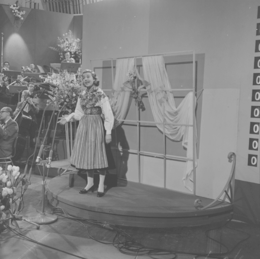
Alice Babs at Hilversum (1958)
-

Ingvar Wixell at Naples (1965)
-
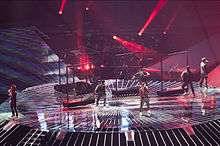
Eric Saade at Düsseldorf (2011)
-
.jpg)
Robin Stjernberg at Malmö (2013)
-
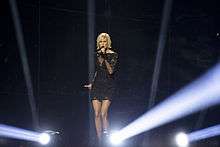
Sanna Nielsen at Copenhagen (2014)
-

Måns Zelmerlöw at Vienna (2015)
Other
No restriction on the nationality of the songwriter and the artist exists in the Eurovision Song contest, which has resulted in countries being represented by songwriters and artist who are not nationals of that country. In recent years Swedish songwriters have been involved in the writing entirely or partly of entries from several countries except Sweden - for instance, in the 2010 the songs from Belarus, Denmark, Georgia, Norway, Ireland and Azerbaijan were written entirely or partly by Swedes; in the 2011 the songs from Russia and Azerbaijan; in the 2012 the songs from Italy, United Kingdom, Ireland, Malta, Greece, Cyprus, Norway, Azerbaijan and Spain; and in the 2013 the songs from Georgia, Finland, Norway, Russia, Netherlands and Azerbaijan, ; in the 2014 the songs from Azerbaijan, Ireland, Denmark, Russia, United Kingdom and Ukraine; in the 2015 the songs from Azerbaijan, Georgia, Moldova, Macedonia, Netherlands, Spain and Russia; In the 2016 the songs from Azerbaijan, Bulgaria, Bosnia and Herzegovina, Czech Republic, Cyprus, Georgia, Lithuania, Norway, Malta, Moldova and Russia
See also
- Melodifestivalen
- Sweden in the Junior Eurovision Song Contest
- Sweden in the Eurovision Dance Contest
References
- ↑ Mirja Bokholm (22 April 2013). "YOHIO presenterar de svenska rösterna i Eurovision Song Contest". SVT.se (in Swedish). Retrieved 22 April 2013.
- 1 2 "Sanna Nielsen och Edward af Sillén kommenterar Eurovision Song Contest". Melodifestivalen. SVT. Retrieved 15 April 2015.
External links
- SVT's site for Melodifestivalen
- Swedish Radio's site for Melodifestivalen
- Gylleneskor.se
- ESC Sweden
- OGAE Sweden, the Swedish branch of the ESC fan club
- Schlager Party, a London series of schlager events
- Schlager Radio
- Points to and from Sweden eurovisioncovers.co.uk

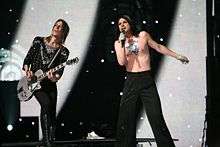
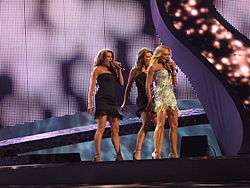
.jpg)